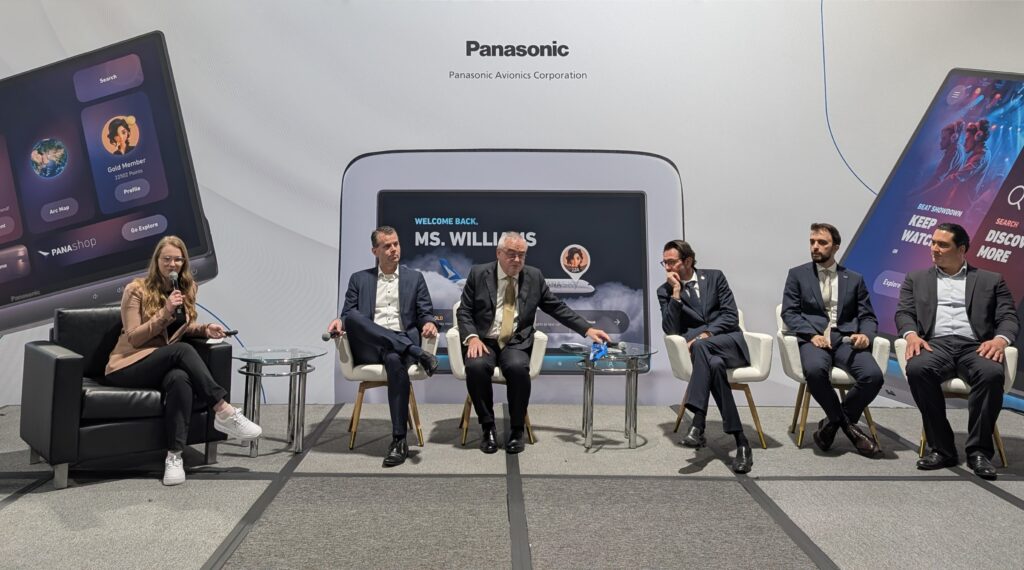Airlines Chart Course for Next-Generation Digital Cabin Experience
Share
At APEX Global EXPO, industry leaders explored how emerging technologies and enhanced connectivity can reshape the passenger experience.
A panel discussion on the ‘next generation digital cabin’, moderated by PAX Tech Business Editor Robynne Trueman, brought together executives from SAS, Emirates, Air France, Turkish Airlines, and Airbus.

Personalisation Takes Center Stage
A clear consensus emerged around personalisation as the cornerstone of future cabin experiences. Turkish Airlines’ Vice President of Customer Experience, Mustafa Mucahitoglu, emphasised how airlines can leverage passenger data to create meaningful touchpoints throughout the journey. “Experience means actually leaving an impact on passengers’ hearts and minds,” he noted, highlighting how everything from dining preferences to entertainment choices can be tailored to individual travellers.
Connectivity: From Pain Point to Priority
The panel identified reliable, high-capacity connectivity as a critical foundation for next-generation cabin services. Patrick Brannelly, Emirates’ SVP of IFE and Connectivity, stressed that poor connectivity has become the industry’s biggest pain point. “No connectivity will drive disloyalty – 100%,” he stated, emphasising the need for systems capable of supporting all passengers simultaneously.
Air France’s SVP of Customer Experience, Fabien Pelous, reinforced this view, noting that connectivity satisfaction currently ranks as the weakest touchpoint across 60 customer journey measurements. “When somebody buys a pass today, they’re always disappointed,” Pelous admitted, emphasising the urgency of upgrading to home-quality streaming across their fleet.
Data-Driven Innovation
Airlines are increasingly leveraging artificial intelligence and data analytics to enhance service delivery. SAS Executive Vice President Paul Verhagen emphasised the importance of robust data collection before analysis: “We have to talk collect, right? Because you can only analyse if you actually have robust and actionable data,” he explained, describing how simple changes to their feedback system yielded tenfold increases in response rates.
Mehdi El Kouch, Airbus’s Head of Connected Aircraft Marketing, outlined a vision for 2030 in which cabins will feature voice control, flexible OLED displays, and augmented reality, all orchestrated through sophisticated digital platforms. “We believe this cabin experience will actually reach a very high level of personalisation across very different channels, from cabin systems to passenger personal devices and wearables, up to the cabin crew service and tablets,” he predicted.
Ancillary Revenue Opportunities
The panel explored how digital cabin features can drive ancillary revenue through personalised offerings. SAS has identified significant potential in contactless ordering systems, particularly appealing to Scandinavian passengers who prefer digital interactions. Emirates is leveraging its extensive customer data to analyse preferences across nationalities and demographics, enabling more targeted service offerings.
Looking Ahead
As airlines invest in next-generation cabin technologies, the focus shifts from simply providing connectivity to creating integrated digital experiences that enhance brand differentiation. Success will depend on airlines’ ability to leverage data effectively while delivering personalised services that resonate with their specific passenger bases.
The discussion highlighted how the digital cabin of the future will be less about individual technologies and more about creating seamless, personalised experiences that drive both passenger satisfaction and airline revenue. As the industry progresses, the emphasis will be on developing robust ecosystems that enable airlines to implement and monetise these advanced capabilities easily.


